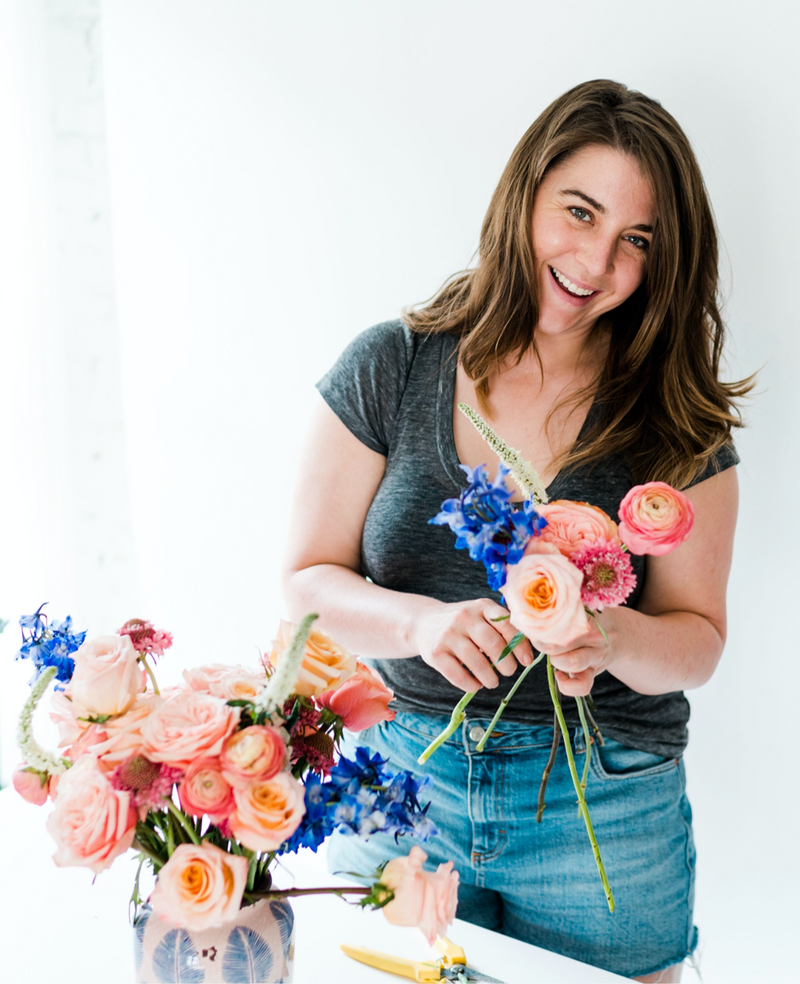In a training for government employees, a facilitator asked the group to write down on a Post-it note: “What about your job makes you wake up every day?”
At the time, Cameron Hardesty was the Deputy Communications Director for the White House Office of National Drug Control Policy under the Obama administration.
“The word that I kept coming back to was ‘beauty,'” she said. “And I realized that I probably needed to make a change, because working in Drug Policy and Communications wasn’t that.”
While her work in the White House was important, Hardesty said, for her, the job wasn’t rosy.
What started out as volunteering in the basement White House flower shop bloomed into a career-change. Hardesty uprooted her career in politics working as the deputy communications director during the Obama administration to start her own floral business, Poppy Flowers.
Growing from the ground up

From a young age, Hardesty recalls being drawn to “beauty.”
Differing from other art forms, flowers, “felt like this very accessible form of beauty that is easy to access as a consumer,” she said.
Bonus points, she could learn about it quickly without formal training.
After seeing the West Wing’s Christmas decorations, Hardesty emailed Laura Dowling, the Chief Floral Designer at the White House, about volunteering in the White House flower shop.
The relationship blossomed into a teacher-student dynamic. Dowling gave Hardesty insight into floral design and introduced her to industry professionals.
In April 2015, Hardesty left politics to work for Urban Stems which she said is “kind of like the millennial version of 1-800-Flowers.”
Eventually, she opened her own business in the summer of 2019 — Poppy Flowers. This year, Poppy Flowers will service around 1,600 weddings around the country.
But Hardesty didn’t completely shut out politics when she left her job.
Hardesty and her husband visited Ukraine in 2018 and have friends who were displaced by Russia’s invasion. Proceeds from their Ukraine-kit fundraise for Ukraine. It’s made up of the country’s national flower, sunflowers, and adorned with other blue and yellow flowers.
In March, $5,562 was donated to Save the Children’s Ukraine Crisis Relief Fund. Next, the kit will fundraise for World Central Kitchen’s efforts in and around Ukraine.
Business-model
When planning her own wedding, Hardesty found ways to save money on flowers, and she applied those lessons to her business-model.
On average, Hardesty said couples spend around $5,000 on flowers for their wedding in most major markets, including D.C. couples who book through Poppy, typically spend around half that much.
Costs are kept down by buying flowers directly from farmers and by using updated sales tech, Hardesty said. Otherwise, people on a budget of $2,500 or less have limited options, such as DIY.
“We’re able to give them a more customized and I would say personalized experience than they would get anywhere else,” Hardesty said. “It’s really cool to see their reactions.”
Woman-owned, woman-led
“From the jump, it was really important to me that Poppy empowered women throughout the floral supply chain,” Hardesty said.
Poppy Flowers has 20 full-time workers and employs around 350 floral designers around the country; 95% of those designers are women.
Of the agriculture workforce, she said around 90% of the workers are women.
The flowers largely come from Latin America; Hardesty said those farms have a majority-woman workforce who are the primary-wage earners in their homes.
“Most people who buy flowers in the U.S. just don’t know that their purchase is empowering women in Latin American countries and making their lives better,” Hardesty said.
Hardesty said she works with farms that provide on-site child care, health care, dental and free laundry machines.
The pandemic pushed many women out of the workforce, but Hardesty said her business model provides consistent employment for designers who work from home or who may move frequently — such as military spouses.
“Poppy enables that type of lifestyle where you can kind of pick up and move, and we still send you jobs, we still provide you training,” she said. “It’s kind of like a workforce in the cloud.”
Poppy raised $4 million of institutional capital for the business. But less than 2% of venture capital goes to woman founders, according to PitchBook research. Hardesty thinks the gap was worsened by COVID-19.
“A lot of women founders solve problems for women,” Hardesty said. “And it’s hard for an all male investment committee to understand the need when they haven’t experienced the problem for themselves.”
Hardesty said that despite the number of women in the industry, most industry executives are men.
“It is powered by women at every level,” Hardesty said. “So it’s especially important to me to highlight the hard work that women are doing at every level of the supply chain, and create more and more opportunities for women to advance their careers within the industry.”








